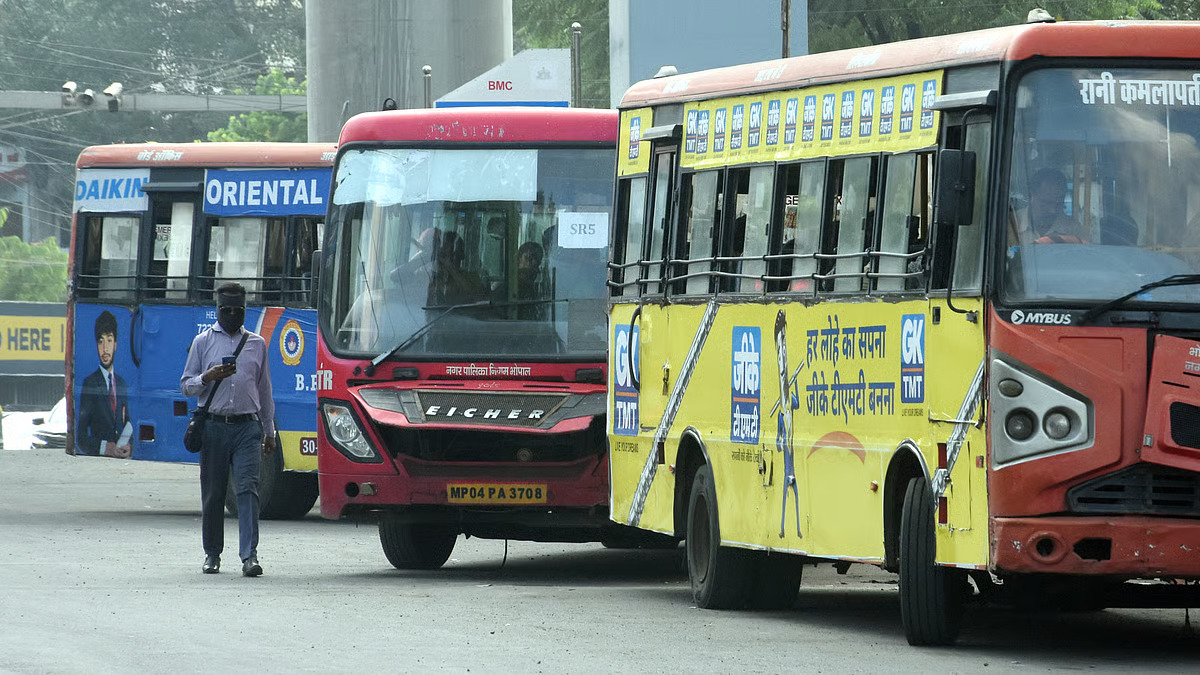The public transport landscape in Bhopal is on the brink of a significant disruption, with city bus services slated to cease operations from July 24. This impending halt, stemming from the expiration of contracts between the city’s transport corporation and private operators, threatens to leave tens of thousands of daily commuters without a viable public transit option. The crisis underscores a critical challenge in urban planning, potentially forcing a greater reliance on private vehicles, thereby jeopardising the city’s aspirations for zero net carbon emissions and equitable, sustainable urban development.
The current state of Bhopal’s city bus network paints a concerning picture. From a peak of 368 buses operating across 24 routes, the fleet has dwindled dramatically to a mere 86 buses covering only six routes. Even within this reduced operational capacity, between five to seven buses frequently remain off-road due to maintenance issues, further exacerbating the scarcity of available transport. This drastic reduction has had a profound impact on passenger numbers, which have plummeted from an average of 1.5 lakh daily commuters to a meagre 10,000 to 12,000. Commuters, who once enjoyed bus arrivals every five to ten minutes, now face frustrating waiting times often exceeding 30 minutes, severely impacting their daily schedules and productivity.
The cessation of services is set to unfold in phases. Thirty-five of the currently functioning buses are scheduled to stop operations from July 23 as their contracts conclude, with the remaining fleet following suit in August. The affected routes include vital arteries connecting various parts of the city, such as SR-2 (Neelbad to Katara Hills), SR-4 (Karond to Bairagarh Chichli), SR-5 (Chirayu Hospital to Awadhpuri), TR-4B (Gandhi Nagar to Vardhman), Mini Bus 413 (Neelbad to Transport Nagar Kokta), and TR-4 (Chirayu Hospital to Rani Kamlapati Station). The discontinuation of these routes will disproportionately affect vulnerable populations, including students, daily wage earners, and women, who rely heavily on affordable public transport for their mobility and access to essential services.
Adding to the complexity of the situation is the unresolved issue of 149 buses belonging to a private operator, which have been lying idle at the Bagsewania depot for over 16 months. The operator reportedly suspended services following disputes over payments and issues with an app-based ticketing agency. Despite the reported clearance of outstanding dues, the operator has reportedly refused to resume services without additional payments, a matter that remains entangled in legal proceedings. This prolonged impasse highlights the intricate challenges in public-private partnerships within urban transport, where contractual disagreements can have widespread societal repercussions.
The long-anticipated introduction of 100 electric buses, a project approved two years ago, was initially slated for deployment by July. However, delays in delivery have pushed their expected arrival to November. This postponement is particularly critical, as the electric bus fleet is central to Bhopal’s strategy for achieving zero net carbon emissions in its public transport sector. The absence of these eco-friendly alternatives means that commuters, left without conventional bus services, will be compelled to resort to less sustainable modes of transport such as private vehicles, auto-rickshaws, and ride-hailing cabs. This shift will inevitably lead to increased traffic congestion, higher fuel consumption, and a surge in urban air pollution, directly undermining the city’s environmental objectives.
The impending collapse of the city bus network presents a significant setback for Bhopal’s vision of becoming a sustainable, equitable, and gender-neutral city. Reliable and affordable public transport is a cornerstone of urban equity, ensuring that all citizens, regardless of their socio-economic status or gender, have unhindered access to employment, education, healthcare, and recreational opportunities. The current crisis threatens to create mobility barriers, particularly for those who cannot afford private transport, thereby exacerbating existing social inequalities and hindering inclusive urban growth.
The city’s transport authorities have indicated plans to escalate the matter to higher governmental levels, including approaching the Minister of Urban Administration and Development and the Chief Minister. This urgent appeal underscores the gravity of the situation and the immediate need for high-level intervention to avert a full-blown public transport crisis. A swift and decisive resolution is imperative not only to restore essential services but also to reaffirm the commitment to developing a robust, sustainable, and accessible public transport system that serves the interests of all Bhopal’s residents. The future of urban mobility in the city hinges on effective governance and strategic planning to ensure that such essential services remain uninterrupted.
Bhopal Public Buses to Stop From July 24 Threatening Daily Mobility
Also Read :Delhi Government To Seek SC Relief On Selective ELV Fuel Ban Order


